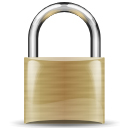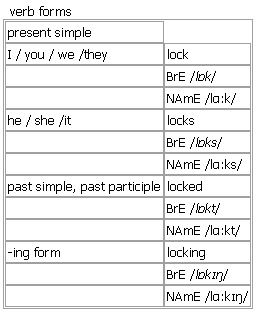 lock
lock

lock [lock locks locked locking] verb, noun BrE [lɒk] NAmE [lɑːk]
verb
1. transitive, intransitive ~ (sth) to fasten sth with a lock; to be fastened with a lock
• Did you lock the door?
• The gates are locked at 6 o'clock.
•This suitcase doesn't lock.
2. transitive ~ sth + adv./prep. to put sth in a safe place and lock it
• She locked her passport and money in the safe.
3. intransitive, transitive ~ (sth) (in/into/around, etc. sth) | ~ (sth) (together) to become or make sth become fixed in one position and unable to move
• The brakes locked and the car skidded.
• He locked his helmet into position with a click.
4. transitive be locked in/into sthto be involved in a difficult situation, an argument, a disagreement, etc
•The two sides are locked into a bitter dispute.
•She felt locked in a loveless marriage.
5. transitive be locked together/in sthto be held very tightly by sb
•They were locked in a passionate embrace.
6. transitive ~ sth (computing)to prevent computer data from being changed or looked at by sb without permission
•These files are locked to protect confidentiality.
Verb forms: 
Word Origin:
v. and n. senses 1 to 5 n. senses 8 to 9 Old English loc Germanic German Loch ‘hole’ n. senses 6 to 7 Old English locc Germanic Dutch lok German Locke ↑lock
Thesaurus:
lock verb T, I
•Did you lock the door?
bolt • • shut • • close •
Opp: unlock
lock/bolt/shut/close a door/gate
lock/shut/close a window/drawer/case/suitcase
lock/bolt/shut/close sth behind you
Example Bank:
•All the valuables were safely locked away.
•He carefully locked the door behind him.
•I locked myself in the bathroom.
•I was terrified they would lock me in again.
•Keep your garage securely locked.
•The door locks automatically.
•The gates are locked at 6 o'clock.
•This suitcase doesn't lock.
Idioms: ↑lock horns ▪ ↑lock, stock and barrel ▪ ↑under lock and key
Derived: ↑lock onto something ▪ ↑lock somebody away ▪ ↑lock somebody in ▪ ↑lock somebody out ▪ ↑lock somebody up ▪ ↑lock something up ▪ ↑lock up
noun
1. countable a device that keeps a door, window, lid, etc. shut, usually needing a key to open it
• She turned the key in the lock.
• It's a good idea to have locks fitted on all your windows.
see also ↑combination lock
2. countable a device with a key that prevents a vehicle or machine from being used
•a bicycle lock
•a steering lock
3. uncountable a state in which the parts of a machine, etc. do not move
4. uncountable, singular (BrE) (on a car, etc.)the amount that the front wheels can be turned in one direction or the other in order to turn the vehicle
•I had the steering wheel on full lock (= I had turned it as far as it would turn).
5. countable a section of ↑canal or river with a gate at either end, in which the water level can be changed so that boats can move from one level of the ↑canal or river to another
6. countable a few hairs that hang or lie together on your head
•John brushed a lock of hair from his eyes.
•She kept a lock of her mother's hair.
7. locksplural (literary)a person's hair
•She shook her long, flowing locks.
8. countable (in ↑rugby)a player in the second row of the ↑scrum
9. singular a ~ (on sth) (NAmE)total control of sth
•One company had a virtual lock on all orange juice sales in the state.
see also ↑armlock, ↑headlock
more at pick a lock at ↑pick v.
Word Origin:
v. and n. senses 1 to 5 n. senses 8 to 9 Old English loc Germanic German Loch ‘hole’ n. senses 6 to 7 Old English locc Germanic Dutch lok German Locke ↑lock
Culture:
canals
Britain’s canals (= man-made channels of water for boats to travel along) were built in the late 18th and early 19th centuries, at the start of the ↑Industrial Revolution. They provided a cheap and convenient means of transport for heavy goods, especially between the mining and industrial centres of the Midlands and north-west England. Coal, grain, clay and other materials were transported on narrowboats, also called barges, that were pulled along by horses walking along a towpath beside the canal. Many miles of channel had to be dug, with some sections passing through tunnels or over aqueducts. Hundreds of locks were built to enable boats to go up or down a hill. A flight (= series) of 20 or 30 locks was needed on some steep sections.
In the US canals were used for a short period to transport goods to areas where there were no large rivers. The most famous, the ↑Erie Canal in New York State, ran from Buffalo on Lake Erie to Albany on the ↑Hudson River and connected New York City with ↑Ohio, ↑Michigan and ↑Pennsylvania. Mules, not horses, were used to pull the barges. The growth of the railway in the 1840s soon took business away from the canals, but the canal system played an important role in expanding trade and encouraging people to move west.
After the railways were built, many canals were filled in. In Britain especially, canals that still exist have become popular with people wanting a quiet country holiday away from traffic. Old narrow boats have been fitted with motors and converted to provide attractive holiday accommodation. Speed is restricted on canals so the pace is slow and restful. Some locks are operated by lock-keepers, but many are worked (= opened and closed) by people on the boats. Going through a flight of locks is seen as part of the fun. At night, people moor their boats at the side of the canal. Canals are also popular with fishermen, and with walkers using the towpath. Many pubs are built beside canals and attract people enjoying a canal holiday or having a day out.
In Britain, some people live in narrow boats and stay most of the time on a particular stretch of canal. These houseboats are often painted in bright colours, with pictures of flowers on the side. On the flat roof there are sometimes traditional jugs and pots painted with similar designs.
Example Bank:
•He turned the lock and pushed the door open.
•Most cars are now fitted with child safety locks on the back doors.
•Prisoners are kept under lock and key 24 hours a day.
•She flicked a stray lock of hair off her face.
•She had long flowing locks and blue eyes.
•She ran around the house, checking all the locks
•The hotels replaced their mortise locks on guest rooms with magnetic card readers.
•We had new locks fitted after the burglary.
•safety locks for handguns
•trigger locks for guns
|
|
